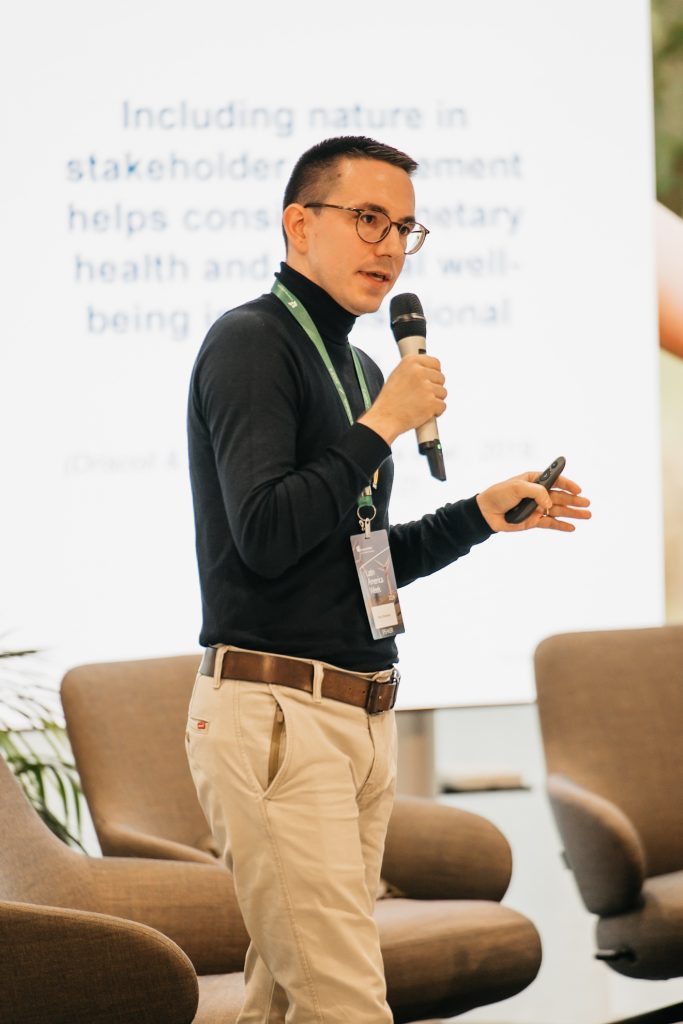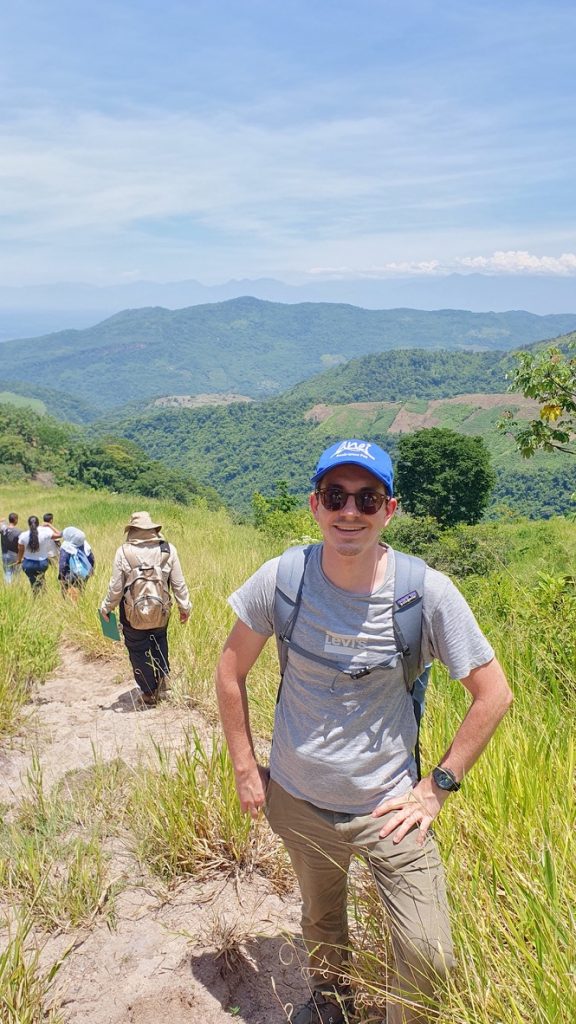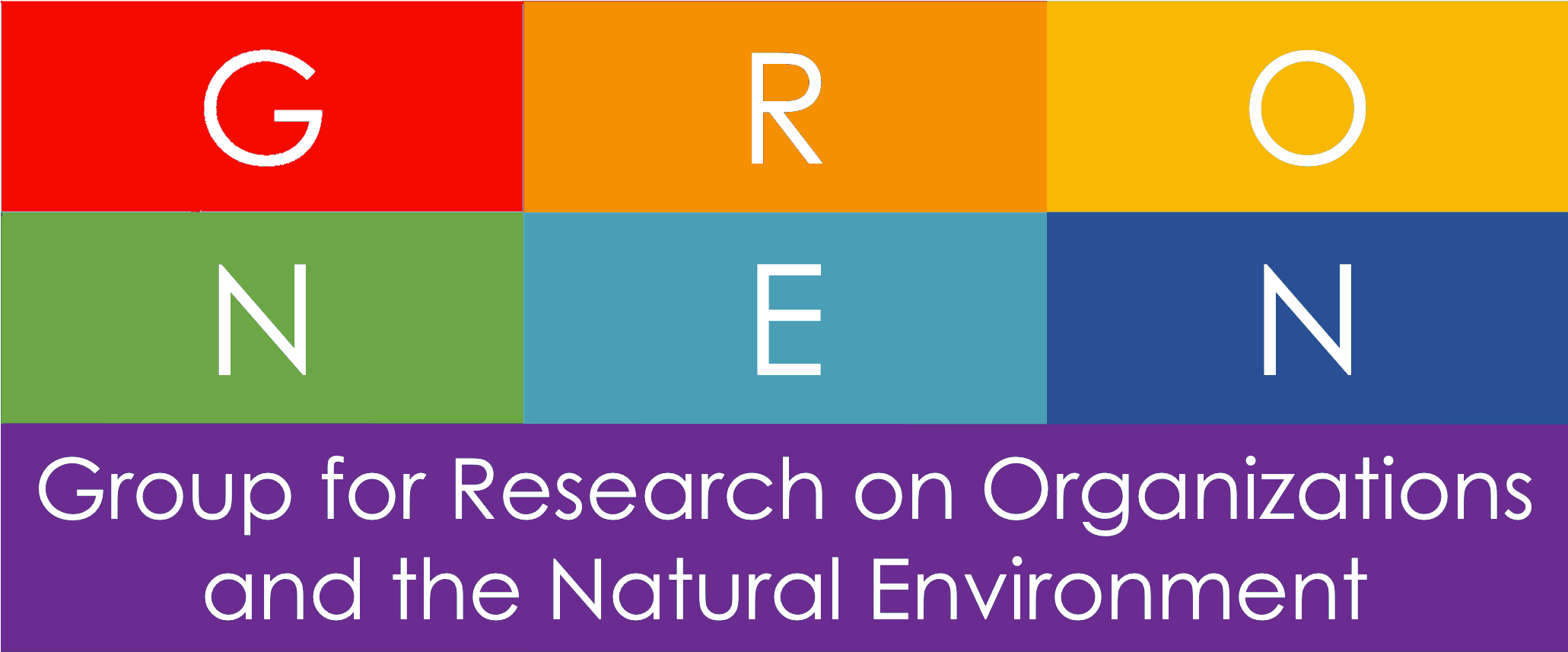
Silvan Oberholzer is a PhD candidate in General Management at the Institute for Economy and the Environment (IWÖ-HSG) at the University of St.Gallen. His research focuses on the integration of nature in stakeholder engagement for value creation that benefits social-ecological systems. His dissertation aims to further extend stakeholder theory toward a more-than-human world, providing organizations with new ways to systematically consider nature in value creation.
Photo (left): Silvan presenting his research on Indigenous businesses in the Sierra Nevada de Santa Marta during the Latin America Week 2024 at the University of St. Gallen, Switzerland.
Here is Silvan’s story.
What are the top three highlights, professional skills, or other experiences you have had during your time as a PhD student?
One of my main highlights has been conducting two field studies: one with Alpine businesses in Central Switzerland and one with Indigenous businesses in the Sierra Nevada de Santa Marta, Colombia. The latter, in particular, was deeply enriching. It taught me much about decolonizing research and how place-based knowledge and understanding of an organization’s nature-embeddedness can inform regenerative value creation. The millennia-old respect for nature as a living being by the Indigenous communities in the Sierra Nevada, with whom I engaged, has been a profound reminder that one of the key challenges that we face as humanity (especially in Western societies) is how we relate to nature.
Equally transformative has been my privilege to participate in various conferences (EGOS, AOM, GRONEN), seminars (Stakeholder Theory Seminar at Darden Business School, Business & Society Research Seminar), and public speaking opportunities (LATAM Week at the University of St. Gallen, csrTag in Vienna). Besides the enriching interdisciplinary learning, these experiences helped me refine my communication and presentation skills. Most importantly, I made connections with many inspiring individuals across borders and disciplines. More generally, the relationships and many friendships made along my PhD journey, including my supervisors and mentors, Prof. Judith Walls and Prof. Sybille Sachs, and the colleagues at the Institute for Environment and the Economy at the University of St. Gallen, are a key highlight for me.
Lastly, teaching corporate sustainability at the HWZ University of Applied Sciences in Business Administration Zurich, has been particularly rewarding. I have had the opportunity to (co-)teach courses at the Bachelor’s and Master’s levels to professionals from diverse industries. Co-learning with these professionals has deepened my passion for making sustainability knowledge accessible and actionable. Teaching reminded me how critical it is to communicate (research) in ways that inspire reflection and change. Knowing how to build an argument, and position a topic to spark interest and make it actionable, has been key.
What inspired you to pursue a PhD?
It was mainly my curiosity, seemingly endless hunger to learn, fascination with exploring how organizations can meaningfully contribute to sustainable development, and passion for research that led me to this decision. During my Master’s studies at the Geneva Graduate Institute, a professor once encouraged me to consider a PhD. Although rather unconsciously at that moment, this encouragement seems to have planted a seed. Finally, a full-time position as a research associate at the Institute for Strategic Management: Stakeholder View at the HWZ University of Applied Sciences in Business Administration Zurich, led by Prof. Sybille Sachs, allowed me to pursue a PhD. In this position, I had the opportunity to work in an inter-institutional, Swiss National Science Foundation-funded research project on transformational leadership in the circular economy from the proposal-writing stage onward, throughout four years of my PhD. At the proposal-writing stage, before the official start of my PhD, working alongside four other researchers deepened my appreciation for collaborative research in corporate sustainability and confirmed that pursuing a PhD was the right path.
How would you summarize your research project(s) in a short title?
An exploration of the consideration of nature in stakeholder relationships for sustainable value creation.
In brief, what is the empirical method/context you are adopting in your thesis?
My first contribution to my cumulative dissertation is a co-authored, peer-reviewed systematic literature review on stakeholder engagement in the circular economy. It relies on qualitative content analysis to untangle the complexity of stakeholder interactions in the circular economy. Besides others, this study revealed that the role of nature in stakeholder engagement in CE, beyond being understood as a value-creation context, remains underexplored.
Building on this insight, I conducted two qualitative, exploratory articles on the inclusion of nature in stakeholder engagement (i.e., nature-inclusive stakeholder engagement) based on insights from nature-related businesses. The first, with Indigenous businesses in the Sierra Nevada de Santa Marta, Colombia, resulted in a single-authored empirical article published in the Business & Society Special Issue on ‘Global Indigenous Peoples: Expanding the Intersection of Business and Society’. This article draws on four months of field research, including observation memos and 27 semi-structured interviews, as well as content analysis of secondary literature (co-)authored by the Indigenous peoples of the Sierra Nevada. The second empirical article draws on 25 semi-structured interviews with representatives of Swiss Alpine businesses to provide insights into the prioritization of nature entities that can be considered as stakeholders (i.e., nature stakeholders).
Can you describe a “eureka moment” you might have had during your PhD?
A defining realization early on in my PhD was that I am in the driver’s seat of my PhD journey. Or as my supervisor, Prof. Judith Walls, once told me: “Your PhD is what you make of it.” This mindset encouraged me, with the support of my supervisors, to explore a topic not yet fully established in management research. In addition, it motivated me to pursue the field research described before and participate in conferences starting in year one of my PhD. To me, being in the driver’s seat of the PhD journey also means consciously managing one’s physical and mental energy across this journey. Understanding how to balance my curiosity with my well-being has been essential to sustaining my creativity and focus throughout my PhD.
What side projects, communities, or other initiatives are you involved with?
During my time working as a research associate at the HWZ University of Applied Sciences in Business Administration, Zurich, I was an active member of the university’s Sustainability Committee. We worked to embed sustainability more systematically in research, teaching, and campus activities.
In addition, I have always been keen to grow personally and professionally. This interest has led me to join the Mentoring Programme of the University of St. Gallen, first as a mentee and, more recently, as a mentor. Guiding students interested in sustainability and personal growth has been a fulfilling way to give back and stay connected with the next generation of changemakers.
What three tips would you offer to new PhD students in your field?
- Make the regeneration of your mind and body your number one priority: Although a PhD may often seem to become one’s “life”, it is not. Create sufficient space for yourself to disconnect from your PhD. Take breaks after intense periods of research and writing. Remain socially connected with family and friends. Do things that increase your mental and physical energy. For instance, especially at the beginning, it may be tempting to attend as many conferences and side events as possible. What has been key for me is staying focused to wisely manage my energy during the PhD journey, which can be compared to a marathon (not from a competition-, but from an energy-related perspective).
- Go for your interests and stay curious: There is probably nothing more critical to a successful and enjoyable PhD journey than working on a research topic that is of genuine interest to oneself. So, early on, go for your interests, but stay curious and remain open during your entire PhD. My PhD has definitely been a non-linear process, which has at times brought insecurities but has also made it interesting. Besides remaining flexible, consider being unconventional: question the status quo and be creative in your research. Unconventionality is the basis for creating impact.
- Be patient and go at your own pace: The PhD journey is unique to each person. At the beginning of this journey, many things may be overwhelming: finding your place in academia, identifying and narrowing down your research topic, participating in conferences, juggling coursework with thesis progress, etc. What helped me was being patient with myself and trusting the process. Don’t compare your progress too much with that of other PhD students but stay focused and check in regularly with your supervisors. Progress will follow naturally. If you are having a hard time, embrace your PhD as a privilege.

What hobbies or interests do you enjoy outside of work?
I love spending time and laughing with my wife, who has been my most important source of mental support throughout the PhD journey, and with family and friends. So, I try to be there for my loved ones as well as possible besides all my duties.
Moreover, I love being in nature, which is where I find balance and recharge energy. In summer, I love hiking in the Alps or swimming in lakes. In winter, there is nothing as beautiful to me as walking through glittering snow on a sunny day.
I also enjoy cultural events ranging from traditional Colombian music concerts to theater and food festivals.
Photo (right): Silvan during his field research in Colombia with the Sierra Nevada de Santa Marta mountain range in the background.
In one or two sentences, what does the GRONEN community mean to you?
The GRONEN community stands out to me for its constructive and collaborative spirit and the space it provides to challenge conventional business and organizational research and practice. I especially enjoyed the 2024 GRONEN Conference in Paris, where I participated in the PhD Days and connected with like-minded PhD students and established scholars passionate about transforming business-as-usual.
What’s next for you?
I entered the final phase of my PhD, writing my last article. Alongside, I recently started working part-time as a sustainability expert in the corporate sector. These times have been intense but exciting, as they allow me to translate academic insights and the skills acquired during my PhD into practice, to contribute to sustainable development. So, I am definitely not getting bored at the moment!
Contact
You can contact Silvan via email at silvan.oberholzer@student.unisg.ch or connect on LinkedIn.

Karelia Dagnaud is a doctoral candidate at the Aalto University School of Business, in Finland. In her research, she explores how researchers and business practitioners learn and organize for sustainability, specifically in the textile sector context.
